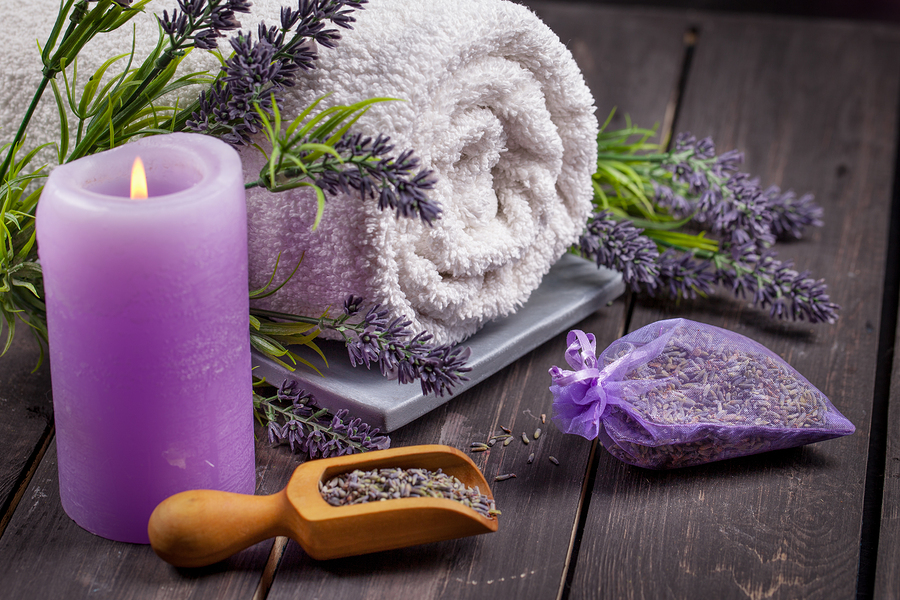
Lavender is commonly used in cosmetic products such as soap and shampoo for its fragrance, but it also has many health benefits that are not as widely known. Lavender can be used to reduce anxiety, improve sleep, and manage pain. Keep reading to learn more about its beneficial effects.
What is Lavender?
Lavender (Lavandula) is a group of plants native to southern Europe, northern and eastern Africa, southwest Asia, and southeast India.
Historically, lavender has been used for medical purposes. In the medieval era, physicians used lavender to treat epilepsy and migraine attacks [1].
Lavender essential oil can be taken orally, inhaled as a mist, or applied topically as an oil or lotion.
Constituents
The genotype, environment, and processing of lavender essential oils affect their chemical composition. Different species of lavender also contain different constituents [2, 1].
Lavender’s main constituents are [3, 1]:
- Linalool
- Linalyl Acetate
- Cineole
- Terpinen
- Camphor
Linalool creates anti-conflict effects while both linalool and linalyl acetate cause sedative effects [1].
Mechanisms
Linalool and linalyl acetate, some of the lavender’s main constituents, have anti-inflammatory and antioxidant properties [4, 1].
In cells, lavender essential oil increases HSP70 activity, which stops LPS-induced inflammatory reactions [5].
Its active components also have an affinity for GABA receptors. Lavender essential oil can inhibit GABA receptor binding, which induces calming effects and reduces anxiety [1].
Health Benefits of Lavender
Lavender has not been approved by the FDA for medical use; extracts and oils generally lack solid clinical research. Regulations set manufacturing standards for them but don’t guarantee that they’re safe or effective. Speak with your doctor before supplementing.
Possibly Effective For
1) Stress & Anxiety
Lavender oil decreases blood pressure, heart rate, and body temperature, indicating a decrease in the fight-or-flight response. It also reduces anxiety, emotional distress, and pain perception [6].
Lavender increased heart rate variability, which signals a higher stress tolerance, in 67 middle-aged women. However, this effect only lasted a short time [7].
Lavender increased relaxing brain waves (alpha and theta) in 20 volunteers [6].
In mice, taking lavender oil orally alleviated their anxiety via N-type and P/Q-type voltage-dependent calcium channels. They inhibited the hippocampus, a region of the brain important for anxiety disorders [8].
In a study of 140 women who recently gave birth, their anxiety, stress, and postpartum depression levels were significantly lower when they inhaled lavender daily [9].
Similarly, lavender oil inhalation reduced anxiety and depression in rats [10].
For low-anxiety situations, lavender helps lower heart rate, increases the variation between heartbeats, and decreases sweat secretion, indicating a decrease in anxiety levels. An increase in variation between heartbeats indicates a higher tolerance to stress [11].
In high-anxiety situations, lavender causes an increase in variation between heartbeats in women and an increase in sweat secretion in men. However, while the increase in variation between heartbeats indicates a mild decrease in anxiety for women, the increase in sweat secretion proves the opposite effect for men [11].
Insufficient Evidence For
The following purported benefits are only supported by limited, low-quality clinical studies. There is insufficient evidence to support the use of lavender for any of the below-listed uses. Remember to speak with a doctor before taking lavender or using lavender oil, and never use it in place of something your doctor recommends or prescribes.
2) Sleep Quality
Lavender inhalation can help with insomnia and improve sleep quality by reducing the stress responses, lowering resting heart rate and increasing the variability between heartbeats in the short-term.
Lavender oil increases sleep efficiency by allowing longer and deeper sleep. It decreases the amount of time spent awake during the night as well as morning tiredness. Also, lavender decreases restlessness [12].
Lavender increased the percentage of time spent in deep, restorative slow-wave sleep in a study of 31 healthy participants. In women, lavender increased light stage 2 sleep and decreased rapid-eye-movement (REM) sleep. In men, lavender has the opposite effect on these two stages [13].
Scientists examined the brain activity of 10 healthy women who were exposed to lavender odor. A brain imaging study showed that lavender increases both brain arousal and feelings of relaxation [14].
3) Cognitive Function
Aromatherapy with lavender, rosemary, lemon, and orange essential oils increased cognitive function in a study of 17 elderly patients with Alzheimer’s [15].
Lavender extract effectively improved the spatial performance of rats with Alzheimer’s Disease [16].
Rats that were injected with lavender oil demonstrated neuroprotective activity against strokes caused by insufficient blood flow to the brain and alleviated neurological symptoms [17].
Lavender oil improved the motor coordination and motor function in rats through the enhancement of dopamine receptors. Dopamine is responsible for movement and emotions [18].
4) Wound Healing
Lavender oil applied to canker sores reduced inflammation, pain, ulcer size, and healing time [19].
Lavender treats wounds, burns, ulcers, and other skin disorders [20].
In rats, treatment with lavender ointment on excision wounds resulted in the wounds healing faster. Lavender ointment also enhanced protein synthesis for tissue restoration [20].
5) Pain and Itch
Lavender essential oil relieved muscle pain and itchiness from insect bites [21].
Aromatherapy using lavender also alleviated joint pain [22, 23].
Lavender essential oil applied topically to the insertion area of a needle reduced the intensity of the pain caused by needle insertion in 30 healthy volunteers and 34 dialysis patients [24, 25].
Menstrual Cramps
In two studies, lavender used in an aromatherapy massage to the stomach region significantly reduced the severity of menstrual cramps [26, 27].
However, the relative effect of the lavender oil and the massage is unknown.
Headaches
In a controlled trial of 47 patients, the inhalation of lavender oil significantly reduced headache severity compared to placebo [28].
6) Hair Growth
In a study of 86 balding patients, the group that massaged a mixture of essential oils (lavender, thyme, rosemary, and cedarwood) onto their scalp experienced an improvement in hair loss symptoms [29].
Lavender oil also promoted hair growth in mice [30].
Animal Research (Lacking Evidence)
No clinical evidence supports the use of lavender for any of the conditions listed in this section. Below is a summary of the existing animal and cell-based research, which should guide further investigational efforts. However, the studies listed below should not be interpreted as supportive of any health benefit.
7) Inflammation
Lavender essential oil has antioxidant and anti-inflammatory effects [31].
In rats, lavender oil prevented inflammation and allergic reactions when applied either topically or through injections [32].
Lavender also suppressed inflammation in the lungs and prevented bronchial asthma in mice [33].
Side Effects & Precautions
Lavender is available as a dried whole or powdered herb, extract, or essential oil. Whole lavender is considered safe to consume as food, but not all preparations of lavender oil are appropriate for consumption by mouth; read any instructions carefully before administering lavender.
Three prepubescent boys who topically applied products containing lavender and tea tree oils on a regular basis developed gynecomastia, the enlargement of male breast tissue. According to the authors, gynecomastia in the three boys was likely due to estrogenic and testosterone-blocking properties in the lavender and tea tree oils [34].
High concentrations of lavender oil can be toxic to human skin cells [35].
If left exposed to air, lavender oil oxidizes to form chemicals that are irritating to the skin. It can cause skin rashes [36].
Common side effects include:
- Stomach pain
- Nausea
- Indigestion [37]
To avoid adverse effects or unexpected interactions, talk to your doctor before using lavender extracts or oils.
Limitations
Although short-term therapy with lavender is considered safe, relatively little is known about its long-term effects on humans. More long-term studies and clinical trials are needed before lavender’s efficiency can be determined.


